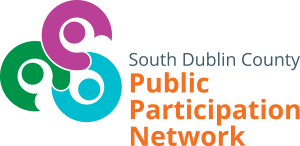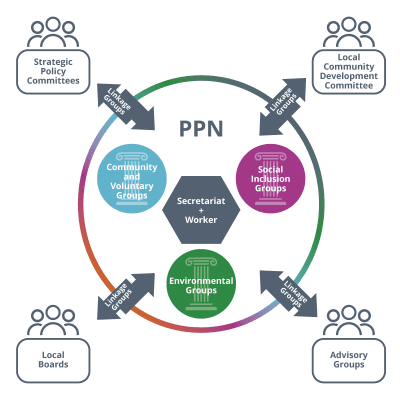How The Public Participation Network Works

Creating and working towards a vision for the well-being of this and future generations.
Identifying issues of collective concern and work to influence policy locally in relation to these issues.
Building strategic and collaborative relationships with decision makers.
Enabling and encouraging members to engage in public consultations.
Electing community, environmental and social inclusion representatives to local authority committees and other policy making boards and agencies.
Acting as an information hub

The PPN is a flat structure. This means that all groups in the PPN have an equal voice and an equal input into decision making. There is no leader, no overall spokesperson or chairperson. It is truly a collective, accommodating a wide range of diverse views and perspectives. It supports each member to develop new skills and contribute in an equal way to the organisation.
The main decision making body of the PPN is the Plenary (i.e. all the independent member groups) which should meet at least twice every year to review the workings of the PPN and set the agenda for the coming period. The elected Secretariat is responsible for the administration of the PPN between Plenary meetings. Subsets of the PPN such as Linkage Groups also inform the process. This is a new way of working which differs from a traditional hierarchical structure and is undoubtedly challenging. However, there is much evidence around the country of it operating well.
Plenary

Glossary of Titles and Acronyms relevant to the Public Participation Network
| Title | Acronym | Detail |
|---|---|---|
| Public Participation Network | PPN | A network of community, social inclusion and environmental groups from across the county. |
| Plenary | The plenary is made up of all member groups of the PPN. The plenary will meet at least twice a year to elect a secretariat, ratify nominees to council committees and vote on other issues as they come up. It will also provide opportunities for information sharing between groups. | |
| Secretariat | The group elected by the plenary to administer the work of the PPN and implement decisions of the plenary. | |
| Linkage Group | A special interest group formed to report on issues to council committees. Linkage Groups will elect representatives to make their reports to council committees and provide feedback to the group | |
| PPN Pillar | The PPN has three pillars; Community, Social Inclusion, and Environment. Groups who register with the PPN must select which pillar they belong to by choosing from the pillar descriptions provided. Groups who select the environmental pillar must be verified by the national environmental pillar. | |
| Local Community Development Committee | LCDC | A partnership between the local authority, community, government departments and other service providers in the county. This committee deals with SICAP and is involved in the development of the LECP for the county. It has been established to ensure effectiveness and efficiency of local and community development funding coming into the county. |
| Joint Policing Committee | JPC | A partnership between the community, the local authority and An Garda Síochána. This committee deals with crime and community safety issues. |
| Strategic Policy Committee | SPC | To advise and assist the local authority in the formation and development of policies. There are 6 SPC's, each with their own themes. These themes are aligned to the work of the departments of the council. |
| Local Economic and Community Plan | LECP | A 6 year plan to be developed by the LCDC. The plan will include economic and community elements and will involve extensive consultation with the PPN |
| Social Inclusion and Community Activation Programme | SICAP | A new funding programme to provide for local development projects in the county. This fund comes from the Department of Environment and is overseen by the LCDC. The first SICAP will be awarded in early 2014 and will be worth about 2 million per year. A tender process is underway. This programme replaces the Local Community Development Programme which was implemented by the Local Development Company for the last 4 years. |
| Local Development Company | LDC | The Local Development Company in South Dublin is the South Dublin County Partnership. this company was formed in 2013 after the merger of Dodder Valley and CPLN partnerships. The company is involved in a wide range of local development work and covers the whole county. |
| Local Policing Forum | LPF | A partnership between the local authority, An Garda Síochána, local drugs task forces and local residents. This group reports to the JPC on crime and community safety issues in local areas. There are 3 forums in the county; Tallaght, Clondalkin and North Clondalkin. |
Linkage Groups
More info coming soon
PPN Reps
Find out who represents your pillar
Secratariat
See a list of our Secretariat members





